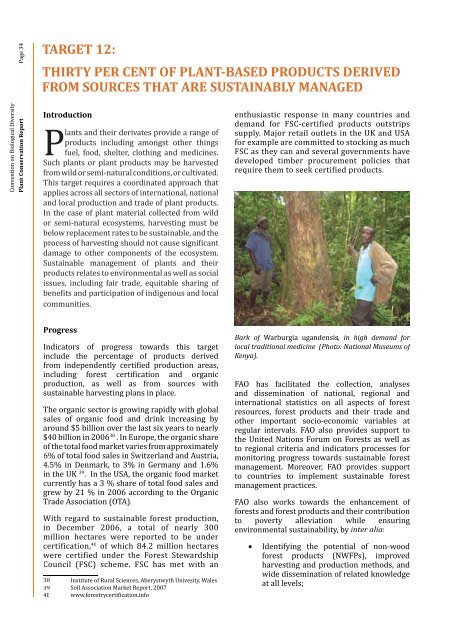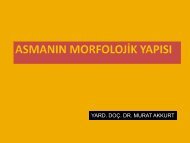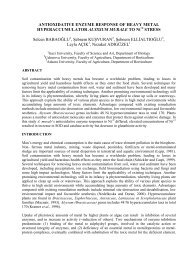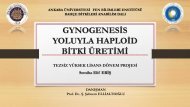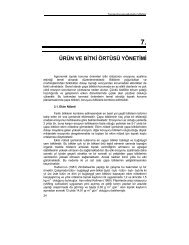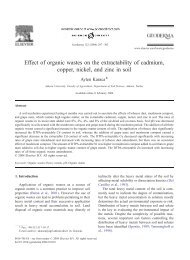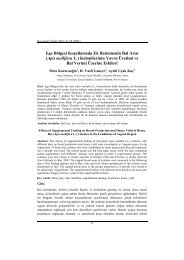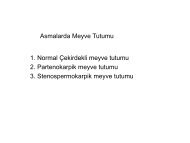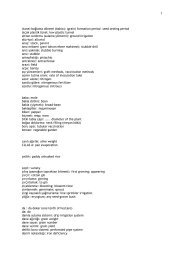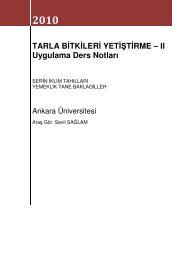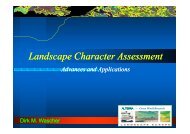from the global partnership for plant conservation
from the global partnership for plant conservation
from the global partnership for plant conservation
You also want an ePaper? Increase the reach of your titles
YUMPU automatically turns print PDFs into web optimized ePapers that Google loves.
Convention on Biological DiversityPlant Conservation Report Page 34TARGET 12:THIRTY PER CENT OF PLANT-BASED PRODUCTS DERIVEDFROM SOURCES THAT ARE SUSTAINABLY MANAGEDIntroductionPlants and <strong>the</strong>ir derivates provide a range ofproducts including amongst o<strong>the</strong>r thingsfuel, food, shelter, clothing and medicines.Such <strong>plant</strong>s or <strong>plant</strong> products may be harvested<strong>from</strong> wild or semi-natural conditions, or cultivated.This target requires a coordinated approach thatapplies across all sectors of international, nationaland local production and trade of <strong>plant</strong> products.In <strong>the</strong> case of <strong>plant</strong> material collected <strong>from</strong> wildor semi-natural ecosystems, harvesting must bebelow replacement rates to be sustainable, and <strong>the</strong>process of harvesting should not cause signiicantdamage to o<strong>the</strong>r components of <strong>the</strong> ecosystem.Sustainable management of <strong>plant</strong>s and <strong>the</strong>irproducts relates to environmental as well as socialissues, including fair trade, equitable sharing ofbeneits and participation of indigenous and localcommunities.enthusiastic response in many countries anddemand <strong>for</strong> FSC-certified products outstripssupply. Major retail outlets in <strong>the</strong> UK and USA<strong>for</strong> example are committed to stocking as muchFSC as <strong>the</strong>y can and several governments havedeveloped timber procurement policies thatrequire <strong>the</strong>m to seek certified products.ProgressIndicators of progress towards this targetinclude <strong>the</strong> percentage of products derived<strong>from</strong> independently certiied production areas,including <strong>for</strong>est certiication and organicproduction, as well as <strong>from</strong> sources withsustainable harvesting plans in place.The organic sector is growing rapidly with <strong>global</strong>sales of organic food and drink increasing byaround $5 billion over <strong>the</strong> last six years to nearly$40 billion in 2006 38 . In Europe, <strong>the</strong> organic shareof <strong>the</strong> total food market varies <strong>from</strong> approximately6% of total food sales in Switzerland and Austria,4.5% in Denmark, to 3% in Germany and 1.6%in <strong>the</strong> UK 39 . In <strong>the</strong> USA, <strong>the</strong> organic food marketcurrently has a 3 % share of total food sales andgrew by 21 % in 2006 according to <strong>the</strong> OrganicTrade Association (OTA).With regard to sustainable <strong>for</strong>est production,in December 2006, a total of nearly 300million hectares were reported to be undercertification, 40 of which 84.2 million hectareswere certified under <strong>the</strong> Forest StewardshipCouncil (FSC) scheme. FSC has met with an38 Institute of Rural Sciences, Aberystwyth Univesity, Wales39 Soil Association Market Report, 200740 www.<strong>for</strong>estrycertiication.infoBark of Warburgia ugandensis, in high demand <strong>for</strong>local traditional medicine (Photo: National Museums ofKenya).FAO has facilitated <strong>the</strong> collection, analysesand dissemination of national, regional andinternational statistics on all aspects of <strong>for</strong>estresources, <strong>for</strong>est products and <strong>the</strong>ir trade ando<strong>the</strong>r important socio-economic variables atregular intervals. FAO also provides support to<strong>the</strong> United Nations Forum on Forests as well asto regional criteria and indicators processes <strong>for</strong>monitoring progress towards sustainable <strong>for</strong>estmanagement. Moreover, FAO provides supportto countries to implement sustainable <strong>for</strong>estmanagement practices.FAO also works towards <strong>the</strong> enhancement of<strong>for</strong>ests and <strong>for</strong>est products and <strong>the</strong>ir contributionto poverty alleviation while ensuringenvironmental sustainability, by inter alia:• Identifying <strong>the</strong> potential of non-wood<strong>for</strong>est products (NWFPs), improvedharvesting and production methods, andwide dissemination of related knowledgeat all levels;


